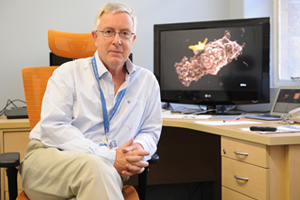A-rating for international HIV/AIDS pioneer
17 February 2014
Emeritus Professor Robin Wood first came across 'slim disease' as a doctor in Zambia in the early 1980s, before the Human Immunodeficiency Virus had been identified, or anyone knew that Acquired Immunodeficiency Syndrome was the result. He had no idea it would one day become a global pandemic - and that it would shape his career and research.
That body of work, nearly two decades of pioneering HIV/AIDS research, has earned the Oxford-trained specialist physician and infectious disease expert an A2-rating from the National Research Foundation (NRF).
World leader
Part of the 2013 round of NRF ratings, it pegs him as a world leader in the field and brings UCT's tally of A-rated academics to 34.
Wood is director of the Desmond Tutu HIV Research Centre at UCT. Attached to his work is a raft of accolades and honours. The South African Medical Society gave him a lifetime award for services to HIV research. He was also a member of the governing council of the International AIDS Society, and a founding member of the Southern African HIV Clinicians Society. He has led the production of several South African national guidelines on the use of antiretrovirals.
Research vanguard
In short, he's been at the vanguard of scientific leadership in HIV treatment and infectious disease research for many years, with over 350 papers published in peer-reviewed journals.It was while working at Stanford University as a fellow (infectious diseases) in 1993 that things began to heat up on the HIV front. His subsequent research looked at early HIV therapies in San Francisco, a city that had borne the early brunt of the epidemic.
It's anecdotal that among Wood's patients was San Francisco Chronicle journalist Randy Shilts, who penned And the Band Played On: Politics, People, and the AIDS Epidemic, published in 1987. It was a searing indictment of (mainly) US government indifference and political infighting around what at the time was considered a disease that affected only gay men. Shilts died of AIDS complications in 1994.
Combination therapy
When Wood returned to South Africa, it was to head the New Somerset HIV clinic, the Western Province's only such resource at the time. He continued his research into ARVs and collaborated in early studies on combination therapy.
He also established one of the few HIV natural-history cohorts outside industrial countries.
"I expanded access to ARVs by developing the first community HIV clinic, at Gugulethu in 2002," he explains, "and this well-characterised treatment cohort documented the impact of ARV therapy on morbidity and mortality of South African patients at a time when treatment in Africa was considered impractical."
Operational research in Gugulethu led to the development of national HIV protocols, implemented in 2004.
As a recognised expert on HIV, Wood has served as a medical advisor and expert witness for the Treatment Action Campaign in the South African Constitutional Court and Competitions Tribunal.
Focus on TB
"It's nice to have the acknowledgement," he says of the A-rating. "I'd like to do the same with TB, and try to turn that around." Wood's focus has now moved to the very high rates of TB infection, particularly among South Africa's children, and the intersection of TB and HIV.
What has perhaps been lost in the HIV/AIDS landscape, he says, is that "TB is an unmitigated disaster".
"There is more TB in Cape Town than in Canada, the US, France and Germany put together. And it's getting consistently worse. "It's what gets me up in the mornings," he says wryly. "We need a new approach to understanding TB transmission." A small black box may hold the answer.
UCT collaboration
Working with colleagues in the Faculty of Engineering & the Built Environment, Wood has developed a machine with a geo-positioning capacity that measures how much air has been rebreathed from others and helps researchers estimate TB transmission probabilities in high-risk areas: buses, trains and indoor settings.
But beneath Wood's history of exploring scientific and medical terra incognita is another story, of a nomad and adventurer.
Varied career
As a student medical officer in 1973 he worked in a jungle hospital in Pucalpa, Peru. Three years later he served as medical officer for the British Hindu Kush expedition in Afghanistan.
From 1979 to 1985, Wood was general practitioner and medical officer to the US embassy and British High Commission in Zambia. He was also medical officer at a game park in that country, where he sometimes treated people who'd been mauled by leopards and the like (his partner was killed by a crocodile). A trained scuba diver, Wood worked in underwater salvage, as many ferries capsized on Lake Kariba.
Story by Abigail Calata. Image by Michael Hammond.
 This work is licensed under a Creative Commons Attribution-NoDerivatives 4.0 International License.
This work is licensed under a Creative Commons Attribution-NoDerivatives 4.0 International License.
Please view the republishing articles page for more information.










